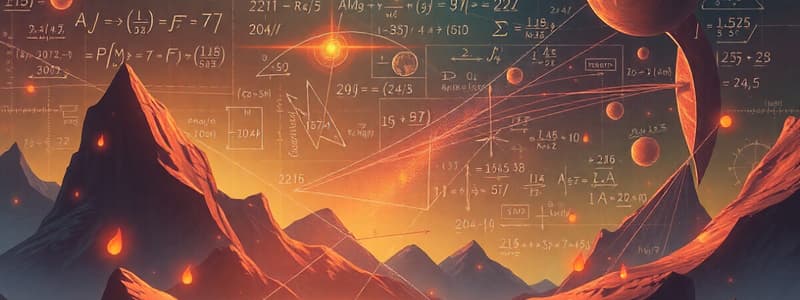Podcast
Questions and Answers
What is the main focus of statistics?
What is the main focus of statistics?
- Exploring the likelihood of events occurring
- Collecting and analyzing data (correct)
- Demonstrating the validity of statements
- Formulating hypotheses
Mathematical models are primarily used for which purpose?
Mathematical models are primarily used for which purpose?
- Developing artistic representations
- Addressing ethical issues in mathematics
- Effectively solving simple equations
- Predicting outcomes and understanding relationships (correct)
Which of the following best describes mathematical problem-solving?
Which of the following best describes mathematical problem-solving?
- Proving the existence of abstract concepts
- Identifying trends and making predictions
- Formulating hypotheses and creating strategies (correct)
- Compiling data for statistical analysis
What role do proof techniques play in mathematics?
What role do proof techniques play in mathematics?
Why is understanding statistics and probability important?
Why is understanding statistics and probability important?
Which branch of mathematics focuses on basic operations involving numbers such as addition and multiplication?
Which branch of mathematics focuses on basic operations involving numbers such as addition and multiplication?
What is a key focus area of algebra in mathematics?
What is a key focus area of algebra in mathematics?
Which concept in geometry deals with the properties and relationships of shapes?
Which concept in geometry deals with the properties and relationships of shapes?
In calculus, which aspect is primarily concerned with rates of change?
In calculus, which aspect is primarily concerned with rates of change?
What is the main focus of number theory within mathematics?
What is the main focus of number theory within mathematics?
Which area of mathematics deals with collecting and analyzing distinct quantities?
Which area of mathematics deals with collecting and analyzing distinct quantities?
What do sets in mathematics primarily represent?
What do sets in mathematics primarily represent?
Which mathematical principle is critical for algorithms used in cryptography?
Which mathematical principle is critical for algorithms used in cryptography?
Flashcards
Statistics
Statistics
The branch of mathematics that involves collecting, analyzing, interpreting, and presenting data.
Probability
Probability
The study of the likelihood of events occurring, expressing it with a probability value between 0 and 1.
Mathematical Modeling
Mathematical Modeling
The use of mathematical tools to represent real-world situations, problems, and systems.
Problem Solving
Problem Solving
Signup and view all the flashcards
Proof Techniques
Proof Techniques
Signup and view all the flashcards
What is mathematics?
What is mathematics?
Signup and view all the flashcards
What is arithmetic?
What is arithmetic?
Signup and view all the flashcards
What is algebra?
What is algebra?
Signup and view all the flashcards
What is geometry?
What is geometry?
Signup and view all the flashcards
What is calculus?
What is calculus?
Signup and view all the flashcards
What is number theory?
What is number theory?
Signup and view all the flashcards
What are sets and logic?
What are sets and logic?
Signup and view all the flashcards
What is discrete mathematics?
What is discrete mathematics?
Signup and view all the flashcards
Study Notes
Fundamental Concepts
- Mathematics is the study of quantities, structures, space, and change. It encompasses a wide range of principles and methods used to model and solve problems across various fields.
- Key branches include arithmetic, algebra, geometry, calculus, and number theory, each with its own specific principles and applications.
- Abstract mathematical concepts often have real-world applications, like in physics, engineering, computer science, and economics.
Arithmetic
- Deals with basic operations involving numbers: addition, subtraction, multiplication, and division.
- Includes concepts like place value, fractions, decimals, percentages, and exponents.
- Fundamental for understanding more complex mathematical ideas.
Algebra
- Focuses on representing unknowns using variables and symbols.
- Involves solving equations and inequalities, manipulating expressions, and understanding functions in terms of algebraic relationships.
- Essential for problem-solving and modelling relationships.
Geometry
- Deals with shapes, sizes, and spatial relationships.
- Includes concepts such as points, lines, angles, polygons, circles, and other geometric figures.
- Explores various properties and theorems related to these figures.
Calculus
- Deals with change and rates of change.
- Includes differential calculus, which deals with instantaneous rates of change (derivatives), and integral calculus, which deals with accumulation of quantities (integrals).
- Used in physics, engineering, and various fields to study problems involving motion, optimization, and other changing phenomena.
Number Theory
- Focuses on the properties and relationships of numbers.
- Includes concepts like prime numbers, divisibility, modular arithmetic, and other specific properties.
- Used for tasks like cryptography and primality testing.
Sets and Logic
- Sets are collections of objects; logic provides the tools for rigorous reasoning.
- Set theory explores concepts like union, intersection, and subsets.
- Logic is fundamental for mathematical reasoning, proof techniques, and building consistent and reliable systems.
Discrete Mathematics
- Examines mathematical structures that use discrete (distinct) quantities instead of continuous ones.
- Includes topics like graph theory, combinatorics, and discrete probability.
- Important in computer science, networking, and other fields dealing with countable or discrete elements or processes.
Statistics and Probability
- Statistics deals with collecting, analyzing, interpreting, and presenting data.
- Probability explores the likelihood of events occurring.
- Important for making informed decisions based on data and patterns.
Mathematical Modelling
- Using mathematical tools and techniques to represent real-world problems.
- Mathematical models can predict outcomes, understand relationships, and simulate complex systems.
- Frequently employed in science, engineering, and other fields.
Problem Solving and Proof Techniques
- Mathematical problem-solving involves identifying patterns, formulating hypotheses, and devising strategies for solution.
- Proof techniques provide formalized ways to demonstrate the validity of statements.
- Understanding these techniques allows for precise and logical development in the subject.
Studying That Suits You
Use AI to generate personalized quizzes and flashcards to suit your learning preferences.




